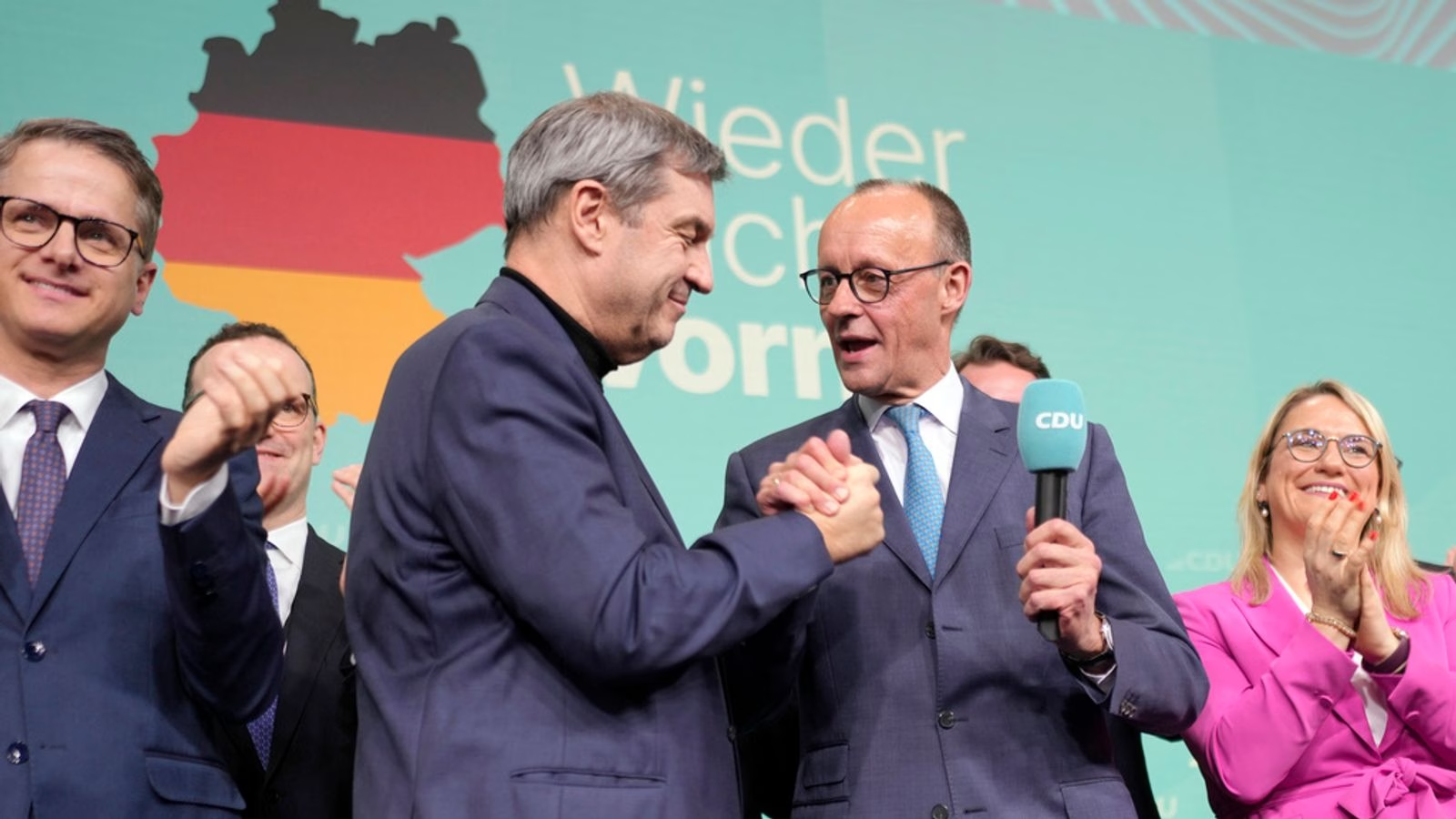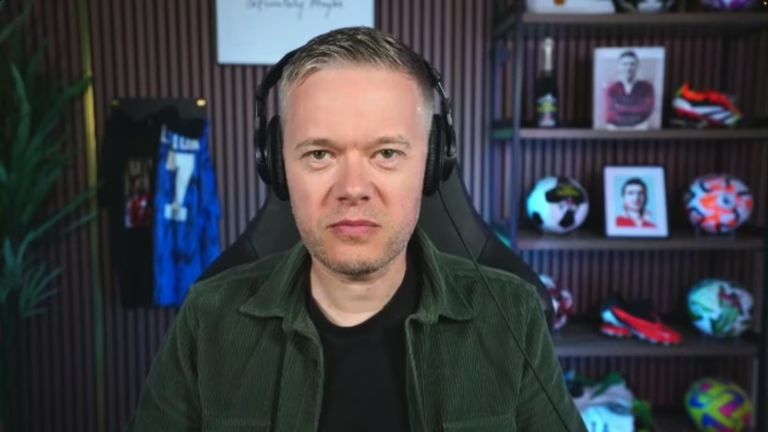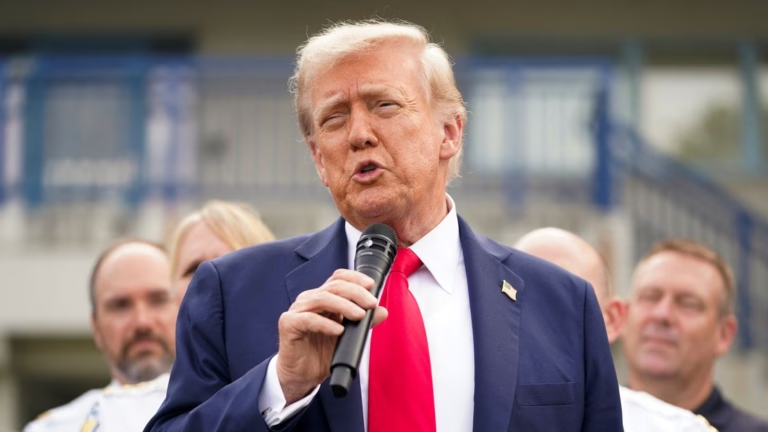<
div data-component-name=”ui-article-body” data-highlight-intro=”true”>
Germany's conservative Christian Democrats (CDU) and their Bavarian sister party, the Christian Social Union (CSU), have won the country's federal election, with the far-right Alternative for Germany (AfD) scoring its best-ever result and Chancellor Olaf Scholz's party experiencing a significant collapse.
The leader of the CDU/CSU bloc, Friedrich Merz, who is likely to become Germany’s next chancellor, stated his intention to form a government as soon as possible, although he acknowledged the challenge this poses.
As it happened: Conservatives and far-right set for record vote shares
Preliminary results indicate the CDU/CSU took the largest share of the vote, with 28.5%, while the AfD won a record 20.8% – its best result in a federal election since its formation in 2013.
Mr Scholz’s Social Democratic Party (SPD) collapsed to third with 16.4% – its worst post-war election result – while its previous coalition partners the Greens took 11.6%.
</a>
In a surprise, the hard-left Left Party exceeded the 5% threshold needed to enter the Bundestag, while the newly-founded left-wing Sahra Wagenknecht Alliance (BSW) narrowly fell short of this benchmark.
The Free Democratic Party (FDP), a former coalition partner and liberal party, also saw its vote collapse to 4.4%, eliminating them from parliament.
Despite the AfD’s result, Mr Merz’s bloc and other mainstream parties have ruled out working with the far-right as part of the long-standing pact known as the “firewall”.
<div class="sdc-article-widget sdc-site-video callfn" data-account-id="6058004172001" data-amp-iframe-embed="" data-asset-id="6b0829ad-7db5-42ed-8c3d-716fe7dc653d" data-asset-path="" data-asset-version="" data-autoplay="false" data-auth-config="" data-caption="Chancellor concedes election defeat" data-clip-type="" data-component-name="sdc-site-video" data-component-name-alias="ui-sitewide-video" data-competition="" data-copy-url-text="URL copied to clipboard" data-fn="sdc-site-video" data-id="id_6b0829ad-7db5-42ed-8c3d-716fe7dc653d" data-is-live-stream="false" data-lite="true" data-options="" data-originator-id="51" data-originator-handle="brightcove-news-gb" data-package-name="" data-provider="brightcove" data-player-id="yjBoKQ5XA" data-playsinline="" data-sensitive="false" data-sdc-id="6838063" data-sdc-video-id="6b0829ad-7db5-42ed-8c3d-716fe7dc653d" data-sport-category="" data-state="loading" data-token-state="none" data-video-ad-unit="" data-video-blacklisted-originator-ids="" data-video-id="ref:6b0829ad-7db5-42ed-8c3d-716fe7dc653d" data-video-type="" data-auto-pause-on-not-visible="true" tabindex="-1" data-closed-captions-position="middle-third" data-show-closed-captions="true" data-show-pip="true" data-show-live-stream-scrubber="true" data-autoload="false">
<div class="sdc-site-video__inner">
<div class="sdc-site-video__content" data-role="bridge-controller" style="padding-bottom: calc(100% / ());">
<p class="sdc-site-video__accessibility-message" data-role="accessibility-message">Please use Chrome browser for a more accessible video player
<span aria-hidden="true" data-role="poster" class="sdc-site-video__poster">
<img loading="lazy" src="https://e3.365dm.com/25/02/768x432/skynews-olaf-scholz_6838059.jpg?20250223202013" alt="Chancellor Scholz concedes defeat after 'bitter election result' for the Social Democratic Party " srcset="" aria-hidden="true" class="sdc-site-video__poster-img"/>
<span class="sdc-site-video__loader"/>
<span class="sdc-site-video__time">0:38</span>
</span>
<video id="id_6b0829ad-7db5-42ed-8c3d-716fe7dc653d" data-embed="default" data-application-id="" class="video-js sdc-site-video__tag" controls="" playsinline=""/>
</div>
<figcaption class="sdc-site-video__caption ui-media-caption">
<span class="ui-media-caption__caption-text" data-role="caption-text">Chancellor concedes election defeat</span>
</figcaption>
</div>
</div>
‘The world out there is not waiting’
Mr Merz faces complex coalition negotiations, and the makeup of his future government will depend on the number of parties entering parliament.
The 69-year-old acknowledged that forming a government would “not be easy,” adding: “The most important thing is to re-establish a viable government in Germany as quickly as possible… The world out there is not waiting for us.”
Read more:
Merkel’s long-time rival on track to become chancellor
The woman at the top of Germany’s far-right AfD party









